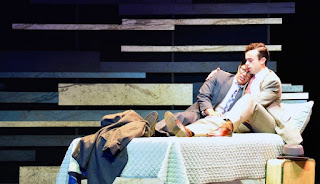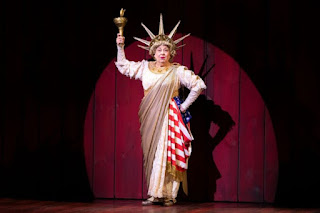 |
| The Latchis marquee also advertised films in two of the theaters - "Emily" and "Beast." |
 |
| The cast of Die Walküre (including the Valkyries) takes a bow at the Latchis Theater. |
 |
| Jenna Rae |
 |
| The Latchis marquee also advertised films in two of the theaters - "Emily" and "Beast." |
 |
| The cast of Die Walküre (including the Valkyries) takes a bow at the Latchis Theater. |
 |
| Jenna Rae |
"Fellow Travelers," a story set in the 1950s era of political paranoia dominated by U.S. Sen. Joseph McCarthy, is the contemporary work in this year's Seagle Festival opera program in the Adirondack mountain town of Schroon Lake, N.Y.
A work with a tender heart by composer Gregory Spears and librettist Greg Pierce, "Fellow Travelers" is based on the novel by Thomas Malton, which traces the doomed love affair of Timothy Laughlin and Hawkins Fuller, federal government employees.McCarthy's zeal to root out supposed Communists in the State Department and the U.S. Army also included homosexuals who, the theory went, were security risks as they could be blackmailed by a foreign agent who might threaten to reveal their sexual orientation.
McCarthy (R-Wis.) exploited genuine concern about the rise of the Soviet Union, the Iron Curtain of repression across Eastern Europe, China's conversion to Communism and the conviction and execution of the Rosenbergs for passing classified nuclear weapons information to the Soviet Union.
Throughout the mid-50s, he and his lawyer ally, Roy Cohn, led or influenced campaigns of persecution, accusing people in government, academia, Hollywood and the military of being Communists, Soviet spies or sympathizers, i.e., "fellow travelers."
 |
| Daniel Esteban Lugo and Joel Clemens in "Fellow Travelers." Photo/Seagle Festival |
In a pre-show lecture, Seagle Artistic Director Darren K. Woods noted that Dupont Circle was a noted gay cruising area. As homosexual acts were illegal in many states, men often met clandestinely in public places, but were also vulnerable to arrest by undercover police.
Laughlin, played with shy sweetness by Daniel Esteban Lugo, is drinking milk with his lunch, prompting the self-assured Fuller, known as Hawk, playfully to dub him "Skippy." Fuller, smoothly played by Joel Clemens, recommends Laughlin for a speechwriting job in the office of Sen. Potter, Laughlin sends him a thank-you gift and Fuller drops by Laughlin's apartment.
 |
| Daniel Esteban Lugo and Joel Clemens in "Fellow Travelers." Photo/Seagle Festival |
Spears has written music that brilliantly matches these vocal parts and characterizations, brought to life by Lugo's supple tenor and Clemens' thrilling baritone. They have a lovely duet, relaxing in Laughlin's apartment, just two men on a bed, singing about placing "my head on your arm."
After their sensual encounter, Laughlin has a slight problem - he's a devout Catholic, a denomination that to this day considers homosexuality "disordered." In a wonderful aria, he begins with "Forgive me, Holy Father, I confess," but ends with "Thank you, Holy Father, for sending him to me." Is there a more poignantly conflicted expression of love and faith, expressed without rancor?
 |
| From left, Daniel Esteban Lugo, Emily Finke, Joel Clemens and Shannon Richards in "Fellow Travelers." Photo/Seagle Festival |
Fuller doesn't even want to, proposing a threesome to the shocked Laughlin, then telling him he's not the monogamous type.
In this shadow world, women play particularly fraught roles. Hawkins' assistant Mary Johnson is attracted to him, but accepts reality. In another gorgeous aria, Shannon Richards' glowing soprano expresses Mary's concern ("I worry") about the fates of the two men.
In a plot turn that seems to be dropped in from nowhere but has obvious ramifications to today's news, Johnson reveals she is pregnant from a one-night stand but "knows a doctor in New Orleans" who "takes care" of such things.
When Laughlin, attempting to escape his anguished relationship, enlists in the Army, Hawkins marries another office worker, Lucy (Emily Finke), and tries to take up the life of a good suburban heterosexual husband. It was, and is, an all-too-common sham that devastated both men and women.
In the last few scenes, the story leans toward soap opera and seems to meander to its inevitable heartbroken farewell, but does reflect the ambivalence of each man's tie to their relationship.
In his lecture, Woods said that composer Spears' inspirations are George Frederic Handel and Philip Glass -- 18th century Baroque and modern minimalism. Glass' typical repetitive musical phrases and Handel's graceful embellishments give Spears' music a shimmering beauty and endless interest. Seagle's cast of "fellow travellers" and the dual pianists, Music Director Neill Campbell and Assistant Music Director Lindsay Woodward, made the most of it.
Under the overall stage direction of Richard Kagey, Evan Johnson's spare set design perfectly melded with Liza Schweitzer's lighting design.
"Fellow Travelers," was co-commissioned by G. Sterling Zinsmeyer and Cincinnati Opera, premiered in 2016 and has had nine productions by major opera companies. It deserves many more.
Joy, joy, joy.
I needed a
dose of the j-medicine badly, grousing through a mid-winter week that was gray,
long and dispiriting.
COVID,
Ukraine and the ordinary run of downers in the news galvanized me to buy a
ticket to the Broadway revival of Meredith Willson’s “The Music Man,” starring
Hugh Jackman and Sutton Foster, in previews now with a Feb. 10 opening.
It worked.
Dr. Theater put his stethoscope to my heart and wrote out a prescription for
two and a-half hours of musical brilliance that put a smile on my face under my
mask for just about the whole time and kept the wintry blues at bay.
Megastar Jackman as con man “Professor” Harold Hill and Foster as Marian Paroo, the librarian who resists his charms, light up this wonderful revival of the American stage classic that shot Robert Preston and Barbara Cook to stardom in the 1950s.
Jackman’s incandescent
sex appeal and singing/dancing chops perfectly fit the character of a man who
can convince an entire town to believe in phantom musical skills.
His
dynamism and irresistible smile seduce the audience as well as the folks of
River City, Iowa in such great numbers as “Ya Got Trouble” (convincing the town
they need a band rather than a pool hall), “Seventy-Six Trombones” (overselling
the magnificence of the band-to-be) and “Marian the Librarian” (dancing to the
rhythm of readers opening and shutting books as he tries to woo Miss Paroo).
Foster’s shining,
wholesome charisma stays under wraps early as Marian tries to interest the
townspeople in literature, copes with loneliness and vows not to settle for the
wrong man, but glows later as she realizes that forgiveness and understanding
can inspire the wrong/right man.
 |
| From left, Shuler Hensley, Hugh Jackman and Sutton Foster in "The Music Man." |
This production tunes up “The Music Man” for a modern age but retains all its heartland charm, thanks to a team of veteran Broadway masters at the top of their game: director Jerry Zaks, choreographer Warren Carlyle, costume and scene designer Santo Loquasto, orchestrator Jonathan Tunick, lighting designer Brian MacDevitt, sound designer Scott Lehrer, music director Patrick Vaccariello.
A tip of
the hat also goes to Jackman and Foster, at ages 53 and 46, in great shape,
although Jackman was breathing a bit heavily after a couple of numbers. Eight shows
a week! I’m in awe.
This group,
with decades of shows and awards in their back pockets (Tunick is 83!), freshens
the show’s strong nod to female empowerment and presents a cast that’s about
one-third African-American. Hill’s pursuit of Marian, which today could seem
like creepy stalking, is given a light touch, especially in the library number.
Loquasto’s red barn scrim and scenic green farmland backdrop strike the right Iowa country notes and the opening number, “Rock Island,” is one of the greatest, giving “The Music Man” the title of “first rap musical,” according to no less than Stephen Sondheim.
Jackman as a teenager auditioned for the show, playing all eight parts:
https://www.youtube.com/watch?v=Bk3l05_XveA
A motley crew
of traveling salesmen riding the Rock Island line sound off – in the rhythm
of the train – about a swindler named Harold Hill selling boys’ band
instruments and uniforms to the unsuspecting rubes, except that “he don’t know
one note from another” and skips town with the money.
Listen to
the lyrics, because these 1912 salesmen are also talking about change that
sounds very modern: "It’s different than it was.” “The Uneeda Biscuit in
an air-tight sanitary package made the cracker barrel obsolete.” “Gone with the
hogshead, cask and demijohn/Gone with the sugar barrel, pickle barrel, milk pan."
“Why it's the Model T Ford made the trouble/Made the people wanna go.” “Who's
gonna patronize a little bitty two by four kinda store anymore?”
Right from
the start, that’s the answer to those who dismiss “The Music Man” as
old-fashioned hokum, or “dated,” as two women said in the row in front of me. Yes,
Zaks retains the silly, giggly girls in the ensemble, just a little, and the
pressure on Marian not to be “an old maid” doesn’t line up with today’s
sensibilities.
But the
show has a tough spine, witnessed by the very next song: “Iowa Stubborn.” Willson
wrote that “The Music Man” was “an attempt to pay tribute” to his home state,
but he saw it with a clear eye: “There's an Iowa kind/A kind-a
chip-on-the-shoulder attitude/We've never been without that we recall.”
At the end
of “Rock Island,” a man who has been quietly listening behind a newspaper
stands up – “Gentlemen you intrigue me. I think I’ll have to give Iowa a try.”
His suitcase says “Professor Harold Hill,” and Jackman received a huge ovation.
The
audience seemed to be saying, “Welcome back to Broadway and please use your
awesome star power to help the theater return to health!” (Only 19 shows are
running in Broadway’s 41 theaters.)
Hill is
welcomed to town by an old friend, Marcellus Washburn, played with earnest good
nature by Shuler Hensley, a memorable Jud Fry in the 1998 “Oklahoma!” revival
that starred Jackman as Curly.
 |
| Jayne Houdyshell as Eulalie Mackecknie Shinn |
Other
standouts were the acrobatic dancer Gino Cosculluela as the local bad boy,
Tommy, wanting to date Mayor Shinn’s daughter, Zaneeta (Emma Crow). Marie
Mullen brings Irish spunk to Mrs. Paroo and Benjamin Pajak is a wonderful Winthrop,
Marian’s little brother with a lisp who touches a level of compassion in Hill
that he didn’t know he possessed. If that kid isn’t actually playing the cornet
at the end with admirable skill, then I’m an Iowa cow.
That this “Music
Man” is finally opening on Broadway pays tribute to the courage and
perseverance of all concerned. Rehearsals began in February 2020, with a
planned fall opening. Oh, the anticipation. Hugh Jackman! Sutton Foster! A $30
million advance!
Then Jackman,
Foster, Carlyle and then-producer Scott Rudin all came down with COVID and Broadway
subsequently shut down for 18 months.
During
that time Rudin withdrew from the show after accusations of abusive behavior with
staff and the investing team brought in British producer Kate Horton.
Rehearsals
began again in fall 2021, with previews starting in December – then Foster and
Jackman tested positive for the latest go-round of COVID and the show shut down
for 11 days in early January.
No matter. Though we may have had to line up outside the Winter Garden Theater with vaccine cards and IDs, and breathe into our facemasks throughout, when the full 25-piece orchestra struck up the first notes of the overture – the jaunty “Seventy-six Trombones” – we were in musical theater heaven.
In the end, “The Music Man” is about the transformative power of melody, rhythm and harmony - making a beautiful noise together. Harold Hill may have come to town looking for a wad of cash, but he really swindles Marian and the citizens out of their stiff-necked, rigid pride, while finally listening to his own heart song.
Strike up the band!